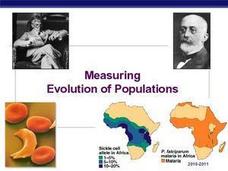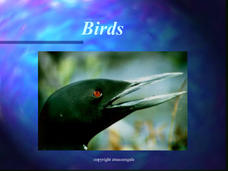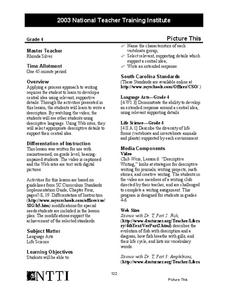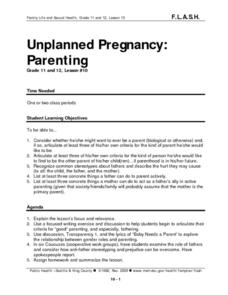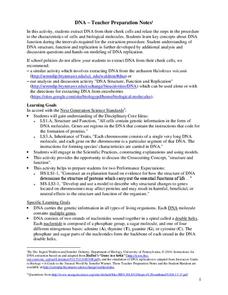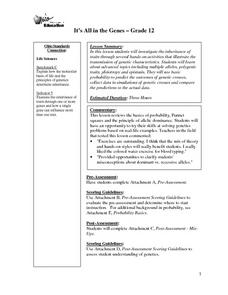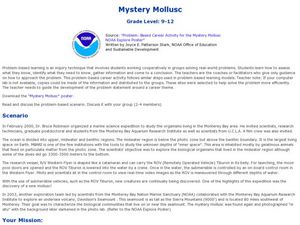Curated OER
Measuring Evolution of Populations
The five agents of evolutionary change are reviewed in this slideshow. Definitions of common terms involved with populations and equilibrium are given, and there are some presentations of Hardy Weinberg equations for common examples of...
Curated OER
The Marvels of Mud
Young scientists roll up their sleeves and get a little dirty in this three-day earth science investigation. Following the scientific method, children monitor the growth of algae in pond water samples in order to determine the role that...
Biology Junction
Viruses, Viroids, and Prions
Are viruses living or non-living? According to the presentation, they are both and neither. Clearly, this requires clarification and an in-depth look at viruses, viroids, and prions. Young scientists learn about the history, structure,...
Biology Junction
Birds
Birds adapted to almost every climate on the planet, from the Arctic to the rain forests. A presentation focused on birds covers their similarities and differences. It starts with their evolution from reptiles, their many physical...
Curated OER
Blue Crabs - The Blue Crab's Chesapeake Journey
A plethora of information about the blue crabs of Chesapeake Bay will amaze and delight your marine biologists. They learn, through direct instruction, about the characteristics and life cycle of this fascinating arthropod. A highlight...
Curated OER
AP: Chapter 25: Phylogeny and Systematics
As a review or note taking guide, this resource wraps up a unit on the tree of life. Biology bigwigs define phylogeny and answer questions about the subsequent classification of organisms. The learning exercise takes a straightforward...
Curated OER
Kingdom: Fungi
The general characteristics that affect classification of fungi and other organisms in the domain Eukarya are detailed for the students on 12 attractive slides. Teachers can access individual slides to cover life cycles or diversity, or...
Curated OER
Your Father
Your learners will explore the idea that not all functions have real numbers as domain and range values as seen in this real-life context. Secondly, the characteristics required for a function to have an inverse are explored including...
ARKive
Biodiversity and Evolution
Why is diversity in biology so important for an ecosystem? Explore biodiversity, evolution, and natural selection with a presentation for your biology class. It features clear information, activities for further understanding, and...
Peace Corps
Family
Family traditions are the focus of a instructional activity that explores the lives of children in India and those in your classroom. Scholars examine their own family roles and traditions, then respond to an informative text detailing a...
Curated OER
Write a Description
Finding the central idea is the focus of this lesson. Middle schoolers write descriptions of different animals using details and descriptive language. They watch a video of kids using descriptive language, and then use showing language...
Curated OER
Chilean Sea Bass
Introduce your mini-marine biologists to using databases. Tables of how many Chilean Sea Bass were caught and number of hours spent fishing are examined. Using the data, individuals calculate the "Catch per Unit of Effort" for each year....
Curated OER
Unplanned Pregnancy: Parenting
High schoolers consider and discuss characteristics of an ideal parent. In small groups, they work together to examine the stereotypical roles of the father and the mother. The issues dealt with in this resource are thought-provoking and...
University of Hawaiʻi
Taxonomy and Me!
Taxonomy is the study of organisms and how you phylum. Three biology activities are included, helping scholars understand four of the six kingdoms, specifically Protista, Plantae, Fungi, and Animalia. Scholars observe and classify in...
Curated OER
Measurement and Variation
Examine the concept of variation through observation and measurement. Middle schoolers will study a peanut and record any distinguishing characteristics visible as well as sketch their peanuts and describe them in writing. Their peanut...
Curated OER
Fungi
The general characteristics that affect the classification of fungi and other organisms in the domain Eukarya are detailed on 12 attractive slides. Teachers can access individual slides to cover life cycles or diversity, or can use the...
Curated OER
Bringing Up Birdy
Students explore biology by creating diagrams of animal life cycles. In this baby bird lesson, students view video clips of birds being born from incubation to flying on their own. Students utilize the Internet to research birds and...
Curated OER
VERTEBRATES
Seventh graders describe the main characteristics of warm-blooded vertebrate animals. They compare and contrast the two different groups of warm-blooded vertebrate animals by looking at external, reproductive, and growth characteristics.
Curated OER
Extracting DNA from Your Cells - Teacher Preparation Notes
Students extract their own DNA from cheek cells. In this biology instructional activity, students explain the replication process. They identify the structure and composition of DNA.
Biology Junction
Introduction to Animals Crossword Puzzle
In this introduction to animals instructional activity, students complete a crossword puzzle with 47 questions on the types and characteristics of animals.
Biology Junction
Bacteria Crossword Puzzle
In this biology instructional activity, students complete a crossword puzzle with 42 questions about bacteria. They identify the different characteristics of bacteria.
Curated OER
It's All in the Genes
Twelfth graders investigate the inheritance of traits through several hands-on activities that illustrate the transmission of genetic characteristics. Students study advanced topics including multiple alleles, polygenic traits,...
Curated OER
The Chordates
Pupils study the characteristics of organisms that are a part of the phylum Chordata. In this organisms instructional activity students identify mammals that are native to Saskatchewan.
Curated OER
Mystery Mollusc
Students investigate the different regions of our oceans by researching the Internet. In this oceanography lesson, students discover the different jobs related to ocean research and examine their roles by reading related websites. ...


